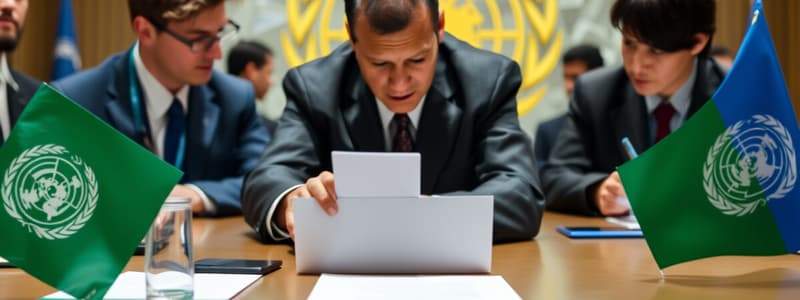Podcast
Questions and Answers
What is the primary purpose of implied powers in international organizations (IOs)?
What is the primary purpose of implied powers in international organizations (IOs)?
- To establish new legislative frameworks for IOs
- To give effect to the agreements made by founders (correct)
- To enforce obligations on member states
- To redefine the powers of member states
What is a restriction on the powers of subsidiary organs created by an international organization?
What is a restriction on the powers of subsidiary organs created by an international organization?
- They can modify the constituent instrument of the IO
- They have the autonomy to dissolve the parent IO
- They cannot create additional obligations for member states (correct)
- They can delegate their functions to other subsidiaries
What role does the judicial organ of an international organization typically serve regarding implied powers?
What role does the judicial organ of an international organization typically serve regarding implied powers?
- Establishing new member rights
- Cancelling subsidiary organ functions
- Granting more powers to member states
- Interpreting what is 'necessary' for IO functions (correct)
Which statement accurately describes delegated powers within an international organization?
Which statement accurately describes delegated powers within an international organization?
What is a valid consequence of suspension of membership rights in an International Organization?
What is a valid consequence of suspension of membership rights in an International Organization?
Which of the following is NOT permitted regarding the delegation of powers by an international organization?
Which of the following is NOT permitted regarding the delegation of powers by an international organization?
According to the ICJ's 1949 opinion, what infers an International Organization's international legal personality?
According to the ICJ's 1949 opinion, what infers an International Organization's international legal personality?
What is the primary limitation on the World Health Organization's authority regarding global smoking bans?
What is the primary limitation on the World Health Organization's authority regarding global smoking bans?
What characterizes the essence of an International Organization's function on the international stage?
What characterizes the essence of an International Organization's function on the international stage?
Which of the following articles of the UN Charter discusses the obligations of member states?
Which of the following articles of the UN Charter discusses the obligations of member states?
Study Notes
Membership in an International Organization (IO)
- Membership rights can be suspended as a temporary measure; obligations to the IO remain intact despite suspension.
- Specific articles of the UN Charter (Art. 5 and Art. 19) govern these processes.
Powers of IOs
- The World Health Organization (WHO) cannot unilaterally ban smoking globally; its powers are subject to interpretation.
- International Court of Justice (ICJ) in the 'Reparations' Advisory Opinion (1949) established that an IO's international legal personality derives from its powers, purposes, and practices.
Types of Powers
- Implied Powers: Exist within the IO’s founding instrument to fulfill its functions. Interpretation of "necessary" actions can vary.
- Implied powers cannot change the founding document or add new obligations to IOs or member states (MSs).
Delegated Powers
- Delegated powers can be granted to subsidiary organs, which do not directly derive from the will of MSs.
- IOs can create subsidiary organs to delegate functions, but cannot increase obligations of the IO or its MSs through delegation.
Inherent Powers
- IOs possess inherent powers essential for performing their required functions, as per ICJ's interpretation in 'Reparations.'
- ICJ acknowledged that certain powers are not explicitly defined but arise from community needs, though still reliant on the founding intent of the IO.
Decision-Making in IOs
- Decision-making processes vary significantly; many follow different rules based on their constitutions.
- Some IOs operate on a ‘one state, one vote’ principle, while others, like the IMF, do not.
Types of Decision-Making
- Consensus: Achieved without a vote through discussions until general agreement is reached; decisions taken by acclimation are common in various IOs.
- Unanimity: Requires all present and voting to agree for a decision to be adopted; carries both advantages and disadvantages.
Legal Implications of IO Actions
- Presumption exists that IO actions align with their intended purposes and are therefore not ultra vires (beyond legal authority).
- Actions deemed ultra vires can be annulled, nullifying their existence with potential implications for the IO’s actions, as highlighted in the ICJ’s 'Certain Expenses' Advisory Opinion (1962).
Studying That Suits You
Use AI to generate personalized quizzes and flashcards to suit your learning preferences.
Related Documents
Description
This quiz explores the intricacies of membership in international organizations (IOs), focusing on the rights and obligations of member states. It discusses temporary measures such as suspension of membership rights and relevant articles from the UN Charter. Test your understanding of the powers and decision-making processes within IOs.




